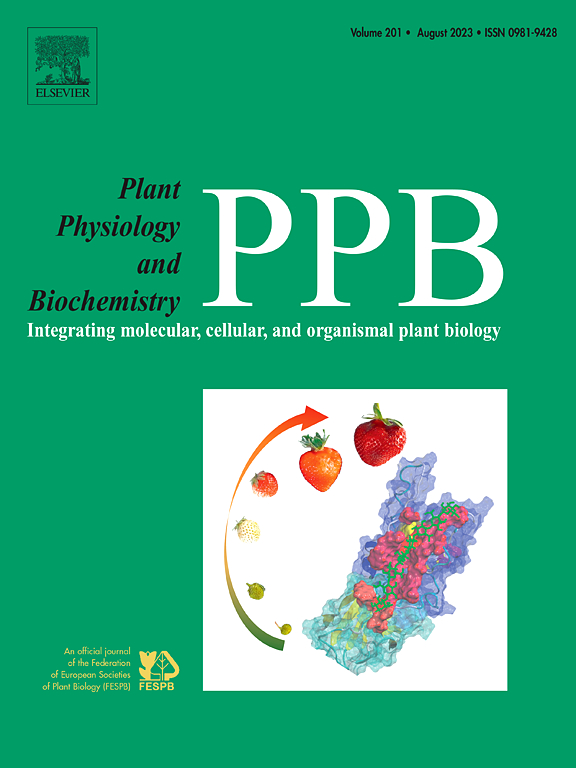The sorghum SbMPK3-SbNAC074 module involved in salt tolerance
IF 6.1
2区 生物学
Q1 PLANT SCIENCES
引用次数: 0
Abstract
Plant NAC transcription factors (TFs) are essential genes that modulate plant responses to abiotic stress. In this study, we identified a novel NAC TF, SbNAC074, in sorghum, which exhibits a response to salt stress. Overexpression of SbNAC074 in tobacco significantly enhanced the salt tolerance of transgenic plants. Measurements of stress-related physiological indicators revealed that the overexpression of SbNAC074 led to a reduction in the accumulation of malondialdehyde (MDA) and hydrogen peroxide (H2O2), while simultaneously increasing the activities of key enzymes such as superoxide dismutase (SOD), peroxidase (POD), and catalase (CAT). Furthermore, we identified SbMPK3, the interacting protein of SbNAC074, and established that SbMPK3 can phosphorylate SbNAC074. Consequently, this study elucidates the function of SbNAC074 and identifies the SbMPK3-SbNAC074 regulatory pathway, thereby providing new insights into the mechanisms underlying salt stress responses in sorghum.
高粱SbMPK3-SbNAC074模块与耐盐性有关
植物NAC转录因子是调控植物对非生物胁迫反应的重要基因。在本研究中,我们在高粱中鉴定了一个新的NAC TF, SbNAC074,它对盐胁迫表现出响应。SbNAC074在烟草中的过表达显著增强了转基因植株的耐盐性。胁迫相关生理指标的测量显示,SbNAC074的过表达导致丙二醛(MDA)和过氧化氢(H2O2)的积累减少,同时增加了超氧化物歧化酶(SOD)、过氧化物酶(POD)和过氧化氢酶(CAT)等关键酶的活性。此外,我们鉴定了SbNAC074的相互作用蛋白SbMPK3,并确定了SbMPK3可以磷酸化SbNAC074。因此,本研究阐明了SbNAC074的功能,确定了SbMPK3-SbNAC074调控通路,从而为了解高粱盐胁迫响应的机制提供了新的见解。
本文章由计算机程序翻译,如有差异,请以英文原文为准。
求助全文
约1分钟内获得全文
求助全文
来源期刊
CiteScore
11.10
自引率
3.10%
发文量
410
审稿时长
33 days
期刊介绍:
Plant Physiology and Biochemistry publishes original theoretical, experimental and technical contributions in the various fields of plant physiology (biochemistry, physiology, structure, genetics, plant-microbe interactions, etc.) at diverse levels of integration (molecular, subcellular, cellular, organ, whole plant, environmental). Opinions expressed in the journal are the sole responsibility of the authors and publication does not imply the editors'' agreement.
Manuscripts describing molecular-genetic and/or gene expression data that are not integrated with biochemical analysis and/or actual measurements of plant physiological processes are not suitable for PPB. Also "Omics" studies (transcriptomics, proteomics, metabolomics, etc.) reporting descriptive analysis without an element of functional validation assays, will not be considered. Similarly, applied agronomic or phytochemical studies that generate no new, fundamental insights in plant physiological and/or biochemical processes are not suitable for publication in PPB.
Plant Physiology and Biochemistry publishes several types of articles: Reviews, Papers and Short Papers. Articles for Reviews are either invited by the editor or proposed by the authors for the editor''s prior agreement. Reviews should not exceed 40 typewritten pages and Short Papers no more than approximately 8 typewritten pages. The fundamental character of Plant Physiology and Biochemistry remains that of a journal for original results.

 求助内容:
求助内容: 应助结果提醒方式:
应助结果提醒方式:


